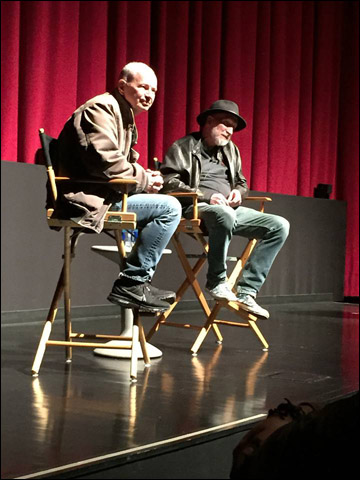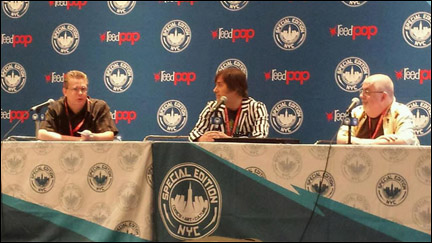|
|
|
|
"Frank Miller got me thinking..." The following are my thoughts concerning Creators' Rights after I was at the School of Visual Arts’ “100 Years of Genius: The Life and Legacy of Will Eisner” event and my visiting the Society of Illustrators’ “WILL EISNER: The Centennial Celebration” art exhibit during April of 2017. -Al Nickerson 
Above photo (Left to right): Klaus Janson and Frank Miller at the School of Visual Arts’ “100 Years of Genius: The Life and Legacy of Will Eisner” event in April 2017. Photo by (DC Comics editor and SVA faculty member) Joey Cavalieri. Frank Miller got me thinking. On April 4, 2017, during his chat at the School of Visual Arts’ “100 Years of Genius: The Life and Legacy of Will Eisner,” Frank Miller talked a bit on the topic of Will Eisner and comic book Creators’ Rights. Miller explained Will’s views on comic book Creator’s Rights and contracts: The most frequent business advice [Will Eisner] gave me was: ‘Stop whining.’ Because I would go in saying: ‘Creators’ Rights this, Creators’ Rights that, Creators’ Rights this.’ And he’d say: ‘Look, if you sign the contract, it’s over. Stop complaining about anything.’ His point of view was simply that if you’re working on other people’s material, then you don’t have that much of a claim. And so, clearly, his whole point was that the future of comics was for people to be introducing new material. (You can watch the entirety of SVA’s “100 Years of Genius: The Life and Legacy of Will Eisner” event here on Youtube.) In the book EISNER/MILLER, Will stated: Take a look at the marketplace and understand what its realties are. I never subscribed to this Creators’ Bill of Rights because I believe that there was no reality to it. In the marketplace, moral rights are often disregarded. And... Well, there is no ingrained right, there are no God-given rights here. The rights are what you negotiate. Now, it’s true that Will was a very savvy business person. (And you really have to be if you want to have a successful career in the arts.) I don’t think that Will would have needed to be reminded by something like (the very important) Creators’ Bill of Rights. However, the vast majority of young artists do need to be reminded and told about the Bill and about Creators’ Rights. (I lecture on all of this in my Sequential Art: Comics Illustration class at SUNY Orange.) In an interview on the Creators’ Bill of Rights and Creators’ Rights for THE COMICS JOURNAL (No. 137, September 1990) by Gary Groth and with Steve Bissette, Scott McCloud stated: Whatever crimes are going on at companies where Creators’ Rights are not honored become pretty quickly irrelevant because essentially it’s your own damn fault if you decide to work thereÖ if there is an alternativeÖ yeah, if you went in with some knowledge. ‘What’s smoking?’ As long as the warning is there. (A must-read and/or must-listen interview with Stephen Bissette and Scott McCloud.) Over the years, I’ve been quite outspoken about comic book Creator’s Rights. In 2005, I began becoming more vocal and more public about my views on Creators’ Rights. I started conversations with folks like Steve Bissette, Dave Sim, Rick Veitch, Scott McCloud, and even with Denis Kitchen, Erik Larsen, and Fernando Ruiz. (All of these discussions are collected and posted at www.yacanteraseink.com) Dave Sim had suggested to me that my eventual departure from Archie Comics may have been due to my public outspokenness on Creators’ Rights. Dave could very well be right. In 2010, I officially ended my contributions toward work-made-for-hire. (Two weeks ago, for about an hour, I was on the phone with a publisher and trying to convince him that I had no interest in working on their work-made-for-hire project.) 
Above photo: This photo was taken in June 2014 during the "Creator-owned Comics (vs. Corporate-owned Comics)" panel at the Special Edition: NYC comics convention which was held at the Jacob Javits Center in New York City. I was joined on the panel by Mike Allred and Kurt Busiek. In 2014, I was on the “Creator-owned Comics (vs. Corporate-owned Comics)” panel held at the Special Edition: NYC comics convention. The panel featured a discussion between myself, Michael Allred, and Kurt Busiek. That panel pretty much summed up my view on Creators’ Rights in regards to Creator-owned Comics versus Corporate-owned Comics. Simply put: Comic book publishers have a horrible history with treating their writers and artists. If you’re interested in playing in the work-made-for-hire sandbox, then know the environment in which you’re working and know what your rights are. For me, now, creator-owned comics are the only thing that I’ll be doing in comics. The topic of comic book Creators’ Rights does still interest me a great deal. I still believe that, at the very least, the Creator’s Bill of Rights is a must-read for professional comic book creators and for young artists who wish to have a career in comics and/or in animation. It’s just that, now, I don’t know if we can actually change the policies of comic book publishers that promote work-made-for-hire. Maybe it’s just best to ignore the likes of Marvel and DC. There are more creator-friendly publishers out there. Why keep flogging a dead horse? My opinion hasn’t changed, exactly. I like to think that my focus has just evolved. I don’t care what the corporate comic publishers are doing anymore. I’m wondering if Will Eisner was more often correct about Creators' Rights than I previously thought. I snail-mailed this article to Dave Sim. Here's my letter to Dave (I clarified a few things in the letter)... April 28, 2017 Hi Dave, How are things? I pray that all is well. I wrote a little something about my recent thoughts on comic book Creators’ Rights. (See attached.) I posted this on my blog, I shared it on Facebook, and I posted it on the Creators’ Rights website. On April 4, 2017, I was at the School of Visual Arts’ “100 Years of Genius: The Life and Legacy of Will Eisner” where Frank Miller talked about Will Eisner. Mr. Miller briefly shared his views on how Will saw comic book Creators’ Rights. (SVA was great with me, as always.) On April 22, 2017, I visited the Society of Illustrators in Manhattan. Currently, they have an exhibit of Will’s artwork on display. Denis Kitchen was speaking about the exhibit which is titled “WILL EISNER: The Centennial Celebration.” (Quite an awesome exhibit. You should check it out, if possible.) Of course, all of this gets me thinking more about Creators’ Rights. Hence, the blog post. I may have been kinda cranky when I wrote the blog post. What I was trying to say was that I remain very supportive of Creators’ Rights, but since Marvel Comics/Marvel Worldwide Inc./Marvel Entertainment, LLC/The Walt Disney Company as well as, DC Comics, Inc./DC Entertainment/Warner Bros. Entertainment, Inc./Time Warner are huge corporations, I’m pessimistic that they’ll ever move further on Creators’ Rights, especially in regards to ownership (i.e.: trademark and copyright). For example, we’ve seen this in recent years in relation to Marvel/Disney settling with the Jack Kirby estate over ownership of Jack Kirby’s co/creation of Marvel characters, as well as Gary Friedrich’s settlement with Marvel/Disney over the ownership of Ghost Rider. It seems clear to me that the likes of Marvel/Disney and DC Entertainment have no intention of sharing ownership of intellectual properties with anyone. History has shown that the “Big Two” would seek legal action and then drop loads of money on people rather than share, give, or give back ownership of characters to creators or their families. (Disney’s contract that I saw back in the 1990s was incredibly bad. Their contract prevented animators from owning anything that they drew, even creator-owned projects that the animators worked on in the privacy of their own home. At that time, there was one animator that I knew that was, also, working for Marvel Comics. He had to be credited using a pseudonym on his Marvel book to avoid any problems with Disney. Of course this was back in the days that Marvel and Disney were separate entities. Now, I don’t know what Disney’s current contract is like, but I would imagine that it wouldn’t be all that different today. Also, I don’t want to imply that Disney’s 1990s contract has become what Marvel’s contract is today. I have no idea about that.) What do you think? In Christ Jesus, Al Nickerson http://anactoffaithcomic.com/ http://www.facebook.com/al.nickerson.3 https://twitter.com/Al_Nickerson John 14:15-20 (New International Version): 15 “If you love me, keep my commands. 16 And I will ask the Father, and he will give you another advocate to help you and be with you forever— 17 the Spirit of truth. The world cannot accept him, because it neither sees him nor knows him. But you know him, for he lives with you and will be in you.” Next: Dave Sim's response to Al Nickerson's "Frank Miller got me thinking..." article...  |
|
|
|
|
|
|
|
|
|
|
|
|
|